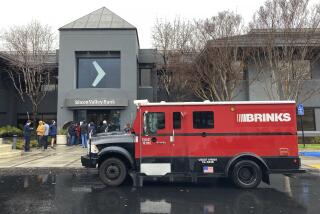Ruling Due by Year’s End on Car Dealer’s Bank Suit
- Share via
SAN DIEGO — Security Pacific National Bank could be forced to pay damages of up to 2% of its net worth--or $40 million--if a Superior Court judge returns a judgment that favors a former San Diego car dealer who has alleged that the bank defrauded him.
Superior Court Judge G. Dennis Adams on Wednesday promised a decision by year’s end in the 3-month-old, often-bitter trial.
The lawsuit alleges that James Williams, who bought part of Baron Buick in San Diego in 1976, was defrauded by Security Pacific managers. The bank, Williams alleged, persuaded him to purchase a troubled Dodge dealership in Los Angeles in April, 1980, so that the bank could free itself from a $2-million loan obligation with the previous owner.
Later in 1980, Chrylser Corp. took over the troubled Dodge dealership and assumed that loan guarantee, while Baron Buick was forced into bankruptcy proceedings after Security Pacific seized its assets.
Although Williams originally banked with General Motors Acceptance Corp. and Bank of America, attorney Pat Frega said, Security Pacific “seduced” Williams into switching his banking to Security Pacific.
The hefty damage request, Frega argued in court, will prevent people “in the corporate executive dining room from laughing at this court.”
Williams’ initially smooth relationship with Security Pacific later soured, so much so, Frega argued, that the bank eventually breached the “trust relationship between a borrower and his bank.”
Security Pacific led Williams to purchase the troubled Viking Dodge agency in order to improve its own financial standing, Frega said. He described as a “Machiavellian fraud” the transaction that left Williams saddled with a dealership that “was destined for disaster from Day One.”
Trust Relationship
“The courts have been saying (recently) that there’s a trust relationship between a borrower and a bank,” Frega said. “That is a quasi-fiduciary responsibility.”
During closing arguments, attorney Robert Steiner, representing Security Pacific, argued that the “bank’s contracts (with Williams) were of high quality” and that “there is neither law nor fact to put together a fraud action.”
Rather, Steiner said, Williams failed to take advantage of Security Pacific’s honest attempts at helping the car dealer straighten out his troubled businesses.
More to Read
Inside the business of entertainment
The Wide Shot brings you news, analysis and insights on everything from streaming wars to production — and what it all means for the future.
You may occasionally receive promotional content from the Los Angeles Times.









